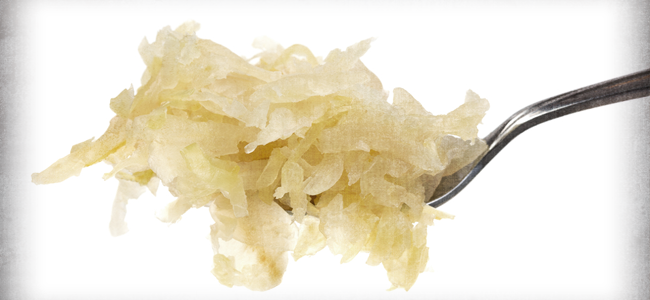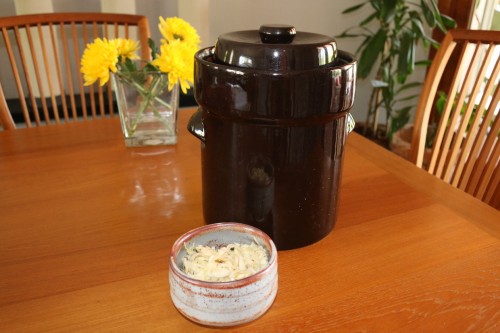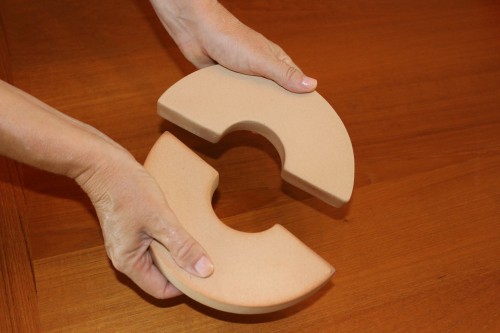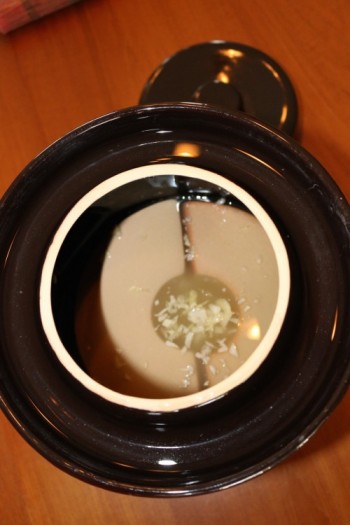
Gott im Himmel! That’s Good Sauerkraut!
“I’ve got something you really need to try.”
Five years ago, Andrew Weil, MD, invited me into the kitchen of his Tucson kitchen, spoke these fateful words, and gave me a conspiratorial wink.
I was at his home to discuss a writing project. But aside from being America’s best-known authority on natural health and healing, Weil was — and is — a brilliant and dedicated gastronome:
- Exhibit one: He has his own chain of hugely successful True Food Kitchen restaurants
- Exhibit two: His kitchen has a walk-in refrigerator.
So the implied question — should we keep grinding on the literary front or stuff our pie holes? — was a no-brainer.
“Bring it,” I said.
Retreating to his pantry, he emerged with a 14-inch-tall ceramic crock. Its top was a circular trench filled with water. The heavy lid’s rim sat in this trench, forming an airtight seal.
He removed the lid, pulled two C-shaped ceramic stones from the interior, and then spooned a generous portion of light-green cabbage for me and one for himself.
“When I was a kid growing up in Philadelphia, the German delis had sauerkraut just like this, actively fermenting in huge barrels,” he said, stabbing his portion with a fork.
Yeah, whatev, I thought. I’d had plenty of canned sauerkraut as a kid. Limp, vinegary, and salty as squid tears. However…
When I took a bite, I knew that I should have trusted the good doctor. Revelation! Teutonic redemption! Crunchy! Piquant! With just enough salt to make it sing!
Gott im Himmel, that’s good sauerkraut!
It was a life-changing moment. Shortly afterward, my wife, Laurie, and I bought this fermenting crock and began chucking all manner of shredded vegetation inside.
While we’ve tried Korean kimchi and various other fermented dishes, we keep returning to making plain sauerkraut.

It’s delicious and nutritious — a rich source of B-complex, C, and K vitamins; calcium and magnesium; and dietary fiber.
But most importantly, raw sauerkraut is a rich source of live lactobacilli, the organisms that impart its characteristic sour flavor. Eating it supports the growth of healthy gut flora — which is, in turn, increasingly understood to be the foundation of robust physical and even mental health.
In fact, several studies link frequent raw sauerkraut consumption to lowered cancer risk.1
So… you can buy sauerkraut with live cultures, but at north of $7 a pound, it’s no bargain.
Fortunately, making it at home is simplicity itself.
Shred two heads of fresh cabbage either with a sharp knife or food processor. Mix in a large bowl with roughly 3 tablespoons of salt. Pack the salted shreds in the crock. Press hard with your fist.
Place the two half-circle-shaped ceramic weights (these come with fermenting crocks; a heavy plate will also work) on top of the cabbage.

Fill the crock’s rim-trough with water and put on the lid. This forms a one-way seal. Carbon dioxide from the fermenting process can bubble out, but fresh air — which may foster mold growth — can’t get in.
If visible brine does not form naturally within 24 hours, add salted water — roughly 1 teaspoon of salt per cup — until the weights are barely covered.

Now comes the hard part — patience!
Good sauerkraut takes time. At our typical kitchen temperature of about 74 degrees, it’s tasty at three weeks, but perfect at four and good for at least six.
Once it tastes right, it can go into fridge, covered, for several weeks more. And don’t forget to drink the juice, which offers many of the same therapeutic effects as the fermented cabbage itself.
I hope you enjoy your sauerkraut journey as much as Laurie and I have. To this day, we offer enduring thanks to our friend Andrew Weil for showing us the way.
Regards,

Brad Lemley
Editor, Natural Health Solutions
[1] EurekAlert. “Sauerkraut contains anticancer compound.” 2002
Written By Brad Lemley
Brad Lemley is a science and health writer and former senior correspondent for The Washington Post and Discover magazine. He is a tireless advocate for safe, natural, self-directed healthy living practices and therapies.
View More Free Articles
The Secret Ingredient to a Longer, Happier Life
Let’s face it. We’re all in need of an attitude adjustment from time to time. After all, when you turn on the news these days, the world can seem pretty dark. That is unless you make it a practice to look for the silver linings. In fact, Harvard researchers say when you do, something quite...
Do You REALLY Need All Those Skincare Products?
I often get questions about skincare products—and here’s what I’ve learned. In today’s beauty-obsessed world, it’s easy to fall into the trap of spending hundreds every month believing you need countless products to fight aging and achieve healthy, glowing skin. However, many dermatologists argue that LESS is MORE when it comes to skincare. Simplifying your...
“Ebb and Flow” Technique TRANSFORMS Senior Brain Health
You know by now that exercise is good for you. It keeps your heart healthy, your muscles strong, and your waistline trim. But what if I told you that a trendy “ebb and flow” workout technique—often associated with young fitness enthusiasts—could actually be a game-changer for us “oldsters” when it comes to brain health? And...
Mailbag: Slash Your Risk of Bone Fractures as You Age
“My doctor recently told me that I have osteoporosis. What can I do to reduce my risk of fractures and maintain strong bones as I age?” – Margaret Hi Margaret, Sorry to hear about your diagnosis. I’m sure it was a shock. Osteoporosis is a serious condition that affects millions of people, and it’s not...
Household Favorite EXPOSED as Cancer Risk?
We all want to believe that the products we use daily are safe. After all, if they weren’t, they wouldn’t be on store shelves, right? Well, I hate to break it to you, but sometimes, the truth is far more alarming than we’d like to admit. The World Health Organization (WHO) has just dropped a...
Hidden Heatwave Threat REVEALED
Heat waves can have serious consequences. After all, staying cool isn’t just a comfort issue. When the mercury soars, it threatens your health—especially when you’re a senior. There are various reasons for this, including chronic medical conditions and bodies that just don’t regulate temperature as well as they once did. But there’s another heat-linked threat...
The Hidden Threat Behind Your Achy Joints
Picture this… You’re trying to enjoy a leisurely stroll in the park, but each step sends a jolt of pain through your knee. Or maybe you’re attempting to open a stubborn jar lid, only to have your fingers refuse to cooperate, leaving you feeling frustrated and helpless. Perhaps you’re simply trying to get out of...
Parkinson's Signs You Can't Afford to Miss
Imagine waking up one day to find your body betraying you. Your hands tremble as you try to button your shirt. Your feet shuffle when you want to walk with purpose. Once strong and clear, your voice now barely reaches above a whisper. This is the reality for those living with Parkinson’s. But what if...
Do Protein Needs Drop with Age? The SURPRISING Answer
I had a patient ask me the other day if they needed as much protein now as when they were younger. After all, we aren’t quite as active as seniors compared to when we were spring chickens. It’s a good question. And the answer might surprise you… Remember when you could devour a whole pizza...
Follow Your “Gut Feeling” to Reduce Diabetes Risk
It seems like every day we learn something new about the incredible influence our gut has on our overall health. From mood to immunity, and even to how well we sleep, the community of microbes in our digestive tract is pulling the strings behind the scenes. So, it should come as no surprise that researchers...









